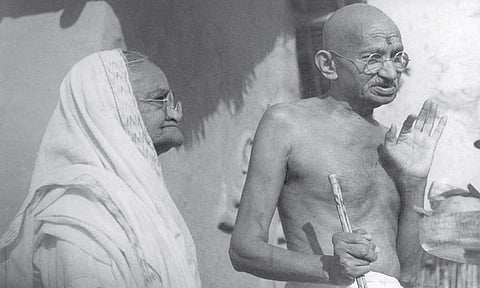

In the summer of 1882, the fourth and youngest child of the Dewan of Porbandar was married to a girl six months older than him. They were once playmates and now husband and wife at the age of 13. The bride was Kastur Kapadia and the groom was Mohandas Karamchand Gandhi. Little did the new bride know, how fascinating, frustrating and an unique experience married life with Gandhi would be.
Neelima Dalmia Adhar’s The Secret Diary of Kasturba is an imagined ‘diary’ written by Kasturba. It begins with the death of Kasturba Gandhi, an old woman dying in jail, remembering her life with the husband who holds her as she breathes her last.
From there, the book goes into flashback, to 1869, when both Kastur and Mohandas were born. Year by year, month by month, tracing one important development after another, Dalmia Adhar’s Kasturba narrates her life.
As a young bride passionately in love with a man who cannot get enough of her—he is so enamoured of her that he even makes hectic love to her while his father lies dying in the same house—to a woman who realises, as time passes, that her husband’s priorities have changed.
As much as this is about Kasturba, it is about Gandhi. As he travels to England to study law and become a lawyer. As he returns to India to discover that there is no work for a lawyer with no understanding of Indian law. As he goes to South Africa to argue a case for an Indian businessman. His experience of racism; his establishment of an ashram-like community at Phoenix and his mobilisation of Indians in South Africa in his first attempt at satyagraha.
From the impressive bibliography at the back of the book, it’s obvious that the author has done her research into the lives of Gandhi, Kasturba, and their family, in particular their eldest son Harilal. This shows in the book too, in the many anecdotes that form part of the narrative. The author’s research makes it a personal story, which otherwise would have been dominated by politics. There is politics, of course, especially in the second half of the book, where the Gandhis’ involvement in the Indian freedom movement takes centre stage. Even there, though, the narrative never becomes completely political; there is always the element of the self, the family, society.
The best thing about The Secret Diary of Kasturba is the way the author explores Kasturba’s mind. A woman torn between her love for her husband and her frustration at his arbitrary and often heartless decisions. A woman pulled two ways, between husband and son, between duty and love, between affection and her own pride.
What emerges is a fascinating picture of a strong-willed woman, traditional yet willing to adapt, affectionate—and undyingly faithful to a man whose treatment of her has been erratic at best, cruelly selfish at worst. What this book lacks is good editing. The language is often clunky; there are grammatical errors, anachronisms, and problems with punctuation. Besides that, the shifts in perspective from that of Kasturba to that of other characters (Gandhi and Harilal in particular), with a third person narrative for a large part of the book, are jarring.